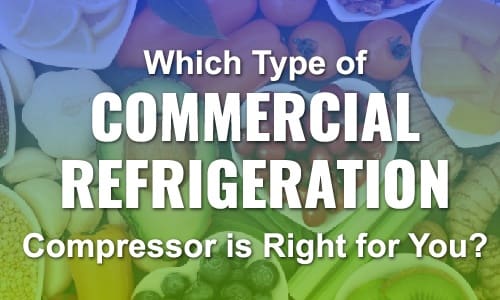Commercial refrigeration systems are a big investment, and if you want yours to work properly, you need to be sure that you have the right type of compressor in place. If you aren’t an expert in refrigeration equipment, you may not know that there are a variety of different compressor types in use today. Here are the major categories you should be aware of:
Reciprocating Compressors
Reciprocating compressors are some of the oldest commercial refrigeration compressor around today. These systems mimic the actions of an internal combustion engine, using a piston to compress the refrigerant before opening a valve to send it into the coils. As the piston draws back, a different valve opens and allows gaseous refrigerant to fill the chamber before being compressed by force again. You can find reciprocating compressors described as single-acting or double-acting. A single-acting compressor only allows refrigerant to work on one side of the piston, while a double-acting compressor allows refrigerant to be continually compressed on both sides of the piston. Reciprocating compressors are very common, but they are not the most energy efficient options around, and they can be difficult to repair and maintain due to their complexity. Nevertheless, some systems continue to use reciprocating compressors because they are very durable and can be used in nearly any application in most environments.
Rotary Type Compressors
Rotary compressors come in several varieties. A rotary vane compressor uses a rolling piston within a sealed chamber to draw gas in on one side of the vane, and then rotates around so that the vane presses against the gas when the ports are closed. As the piston rolls the rest of the way around the cylinder, the discharge port is opened up, allowing the newly compressed refrigerant to flow back out of the cylinder.
On the other hand, a screw or scroll type system receives a constant stream of gaseous refrigerant on the outside. The spinning of the screw or the orbital scroll pulls the gas toward the center of the system, slowly compressing it as it works its way closer and closer inward. An outlet tube in the center of the scroll allows the fully compressed refrigerant to make its way out.
Rotary type compressors have become increasingly popular in commercial refrigeration compressor, because they require fewer parts and less maintenance. They are also capable of handling more refrigerant in less time with less power. Screw and scroll type compressors, in particular, are known for being smaller than their reciprocating counterparts, so they can be used in tight spaces where refrigeration room needs to be maximized.
Centrifugal Compressors
One major breakthrough in the industry has been the centrifugal compressor. These compressors work similar to that of a jet engine. The gaseous refrigerant enters the chamber at one end and is quickly picked up by a set of spinning impellers. The faster the gas is spun, the more centrifugal force acts on it, compressing it into liquid form. These systems can be classified by the number of compression impeller stages that are present, allowing you to create extra pressure when necessary. These compressors are solely built for industrial and commercial refrigeration and HVAC systems because they can be very costly. However, they are the most powerful compressors on the market today, and the most efficient in the long run.
Now that you understand the different types of commercial refrigeration compressors available, you can begin shopping for the perfect compressor for you. Keep in mind that these are broad categories, and each individual compressor and brand will have its own benefits and limitations. You will need to speak with a refrigeration expert to find a compressor that fits your equipment properly and can provide sufficient compression for your needs. Call Compressors Unlimited today to learn more about commercial refrigeration compressor.












